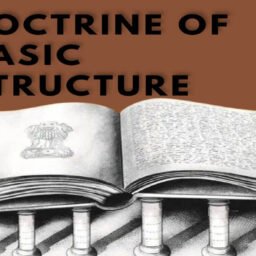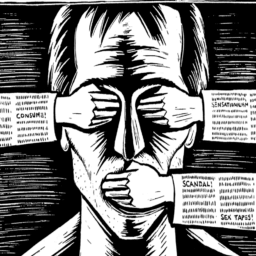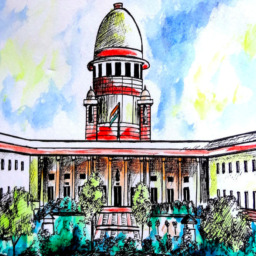FREEDOM OF SPEECH AND DISSENT
“Freedom of mind is the real freedom”. These words by Dr BR Ambedkar signify the true essence and outcome of independence. The connotation of independence of any nation lies in the ability of its people to think and express themselves freely. The Fundamental Right to Speech and Expression, envisaged in Article 19(1)(a) of the Constitution of India, denotes the significance of this meaning of independence. Dissent is an equally important expression of voice, often used against the policies of the government. It signifies the diversity of opinions on any subject. As Justice DY Chandrachud wrote in his dissenting judgment in Romila Thappar[1] of 2018, “Individuals who assert causes which may be unpopular to the echelons of power are yet entitled to the freedoms which are guaranteed by the Constitution. Dissent is a symbol of a vibrant democracy. Voices in opposition cannot be muzzled by persecuting those who take up unpopular causes.”
The media, rightly known as the fourth pillar of democracy, plays an important role in assuring that citizens get a voice to opine their views freely. It, therefore, becomes important that media in itself should be free from any kind of influence, threat or bias. The legacy of the role of media in its ability to raise people’s voice can be assessed by the fact that after the proclamation of emergency in 1975, one of the first actions the then government took was to cut the power supply of the prominent media houses, so that the reality of the draconian step could not be shown easily to the people. In recent years, there has been a spike in charging media persons with offences against the state, like sedition.
ATTEMPTS TO CURB VOICES OF JOURNALISTS
‘Sedition’ under Section 124A of the Indian Penal Code means, “Whoever, by words, either spoken or written, or by signs, or by visible representation, or otherwise, brings or attempts to bring into hatred or contempt, or excites or attempts to excite disaffection towards, the Government established by law”. It was introduced to crush the voices against the British Government. Mahatma Gandhi called Section 124A “The prince among the political sections of IPC designed to suppress the liberty of the citizen”. Jawaharlal Nehru called the provision “obnoxious” and “highly objectionable” and “the sooner we get rid of it, the better”. The expectation to delete this law from the IPC was shattered and the government rather strengthened it by making it a cognizable offence in 1970s.
When media persons are charged with such an offence for seemingly raising their voice against the government while reporting true events, it reflects an attempt of the government, irrespective of the party in power, to convert the independent nation into an Orwellian state. Recently, the Supreme Court quashed the charges of sedition framed against Vinod Dua[2], a senior journalist. The Supreme Court in the same month stayed any coercive action against two Telugu news channels who were critical of management of Covid-19 by the Chief Minister of Andhra Pradesh. The Apex Court said that every journalist is entitled to protection under the 1962 judgment of Kedar Nath Singh v State of Bihar[3]. In Kedar Nath Singh, the Apex Court tested the constitutionality of Section 124A and held it constitutional. It laid down in the same judgment that a person cannot be held guilty unless his acts have an intention or tendency to create disorder, or disturbance of law and order; or incitement to violence. The Supreme Court in Balwant Singh and another v State of Punjab[4] (1995), relying on the Kedar Nath Singh, held that even slogans like “Raj Karega Khalsa”, “Khalistan Zindabad” does not amount to sedition. The court said that the slogans did not attract any elements of violence and therefore the charge under Section 124A of the IPC does not stand. It, therefore, becomes alarming that media persons often face the offence of sedition, which in very rare cases result in a conviction. The intent of the establishment becomes suspicious of trying to threaten the media and curb the voices of dissent. It is a matter of immense concern that in the largest democracy of the world, journalists have to face such charges. Five journalists were arrested in only the first two months of 2021 during the farmers’ protest. It is the highest number of media persons arrested in a year since 1992. The 2021 World Press Freedom Index produced by Reporters Without Borders (RSF), a French NGO, has again placed India at 142nd rank out of 180 countries.
PREVENTION OF MALICIOUS PROSECUTION OF JOURNALISTS
There is a need to devise a structure in which a journalist cannot be harassed by misuse of laws. The author proposes the following commission to be established in every state. Every state government should bring a legislation to set up a 3-member commission headed by a retired judge, comprising of the Home Secretary of the state, a representative of the Press Council of India or such organisation, to speedily investigate any such charge before the trial in the court commences. The above-mentioned commission shall not be a judicial commission, i.e. the commission shall have the power to only investigate in such cases. The committee shall be given one month to submit its report. The report of the commission shall be the basis of the trial.
CONCLUSION
The primary reason to establish a pre-trial investigative commission is to create a shield between the state and the press, in order to protect the press from malicious prosecution from the state. The commission would ensure that no journalist faces malicious charges. Malicious prosecution of journalists is a detriment to democracy. Misuse of sedition laws against journalists is an attempt to control the press. As Jim Morrison rightly said, “whoever controls the media, controls the mind”, the state often attempts to create a narrative in its favour through media. Such a situation offers no room for dissent. In order to protect the very essence of democracy, it is extremely significant to protect the media. Democracy thrives when its media is free.
Author(s) Name: Vansh Bhatnagar (Rajiv Gandhi National University of Law, Patiala)
References:
[1] (2018)10 SCC 802
[2] LL 2021 SC 266
[3] AIR 1962 SC 955
[4] AIR 1995 SC 1785
















